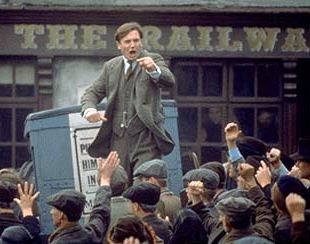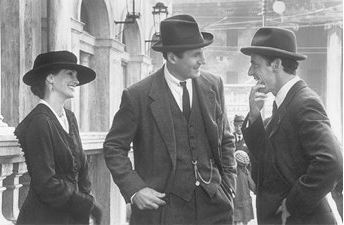Heroic Slide
Rallying the Troops: Liam Neeson's Michael Collins stirs up some
Neil Jordan's new Irish epic, 'Michael Collins,' rouses a rebellion before descending into political squabbling
By Richard von Busack
FIRST THE SCOTS saw their national epic onscreen in Braveheart; now the Irish can see theirs. Irish director and screenwriter Neil Jordan's Michael Collins tells the story of the Irish struggle for independence from 1916 to 1922 by lauding the revolutionary hero about whom (perhaps too sympathetically) historian Carlton Younger wrote, "It is on the loom of Collins's memory ... that Irishmen are weaving the pattern of enduring national unity."
Collins was called "one of the most courageous leaders ever produced by a valiant race" by British Prime Minister Lloyd George, who once offered £10,000 of his government's money for Collins' head. Such a man can't last, and indeed Collins followed the path of disappointment and betrayal previously trod by Emiliano Zapata and Che Guevara.
For its first half, however, the rousing Michael Collins speeds viewers through scenes of the doomed Easter Rebellion that have the "terrible beauty" described in Yeats' poem. Only in the second half, when squabbling and political infighting--especially between Collins and the leader of the Irish, Eamon De Valera (Alan Rickman)--betray the revolution's furor, does the film's force become diffused.
With Michael Collins, Jordan chose a subject that made him, he claims, lose more sleep than anything else he'd filmed. In an interview during his short stop at the Irish mecca of San Francisco, Jordan joked that this was his first movie where "I ran the possibility of being assassinated."
A guerrilla-war strategist, Collins helped to lift the 800-year-old British presence in Ireland through a campaign of assassination and espionage that defeated the notorious Black and Tans occupation force.
"We brought the British Empire to its knees," boasted the Irish rebels. Granted, the empire had just lost hundreds of thousands of soldiers at the Western Front and was fairly weak in those self-same knees. Still, Collins delivered a living lesson that guerrilla fighters have followed ever since, particularly Mao Zedong, whose advice to revolutionaries to hide amidst the people as a fish hides in water might well have been inspired by Collins. And like all of the great revolutionaries, Collins didn't die in bed; viewers with even a nodding history of Irish history will already suspect that it wasn't the British who killed him.
JORDAN'S INSTINCT to make the first part of Michael Collins a species of Robin Hood movie proved sound. Even if Collins' life stands as just the initial chapter in a long tale of modern Irish troubles, this biography evinces the mood of a swashbuckler, and Jordan revels in more action than you'd expect from a poetic and contemplative director.
Similarly, Neeson greets the title role with old-fashioned movie-hero ebullience, especially compared to his Scottish partisan Rob Roy, who always seemed to be posed, staring into the middle distance at a brighter future. Neeson plays Collins as a daredevil, plotting jailbreaks and arsenal robberies, and cheekily borrowing a light for his cigarette from the British officer sent to capture him.
Jordan makes sure the adventure doesn't come across as merely mindless adventure. The killings are necessarily bloody and sordid. Collins, hardened against pity, complains that riddling the enemy with bullets wastes costly bullets.
In the interest of keeping Collins sympathetic, Jordan avoids some of the messy details of history; then as now, the guerrillas used the cover of the war to settle grudges. But Jordan smartly refuses to make Collins the complete, admiring focus of his film. A subplot involving Stephen Rea as a British clerk who turns secret agent is every bit as gripping as the main story.
Not so gripping, unfortunately, is the romantic subplot. As Kitty, Collins' fiancée, Julia Roberts looks very much like an actress cast under the protests of the director. Jordan introduces her coolly, in a long shot advancing to the camera from across a farm yard. Roberts' remarkable beauty is starting to fade inward as she ages, into a neurotic isolation. (She seems to be grooming herself for madwoman parts.)
Roberts' Kitty sits at the apex of a mandatory romantic triangle with Collins and his best friend, Harry Boland (Aidan Quinn). This diversionary subplot doesn't last too long, but it strains the attention span to see such John Fordstyle silliness.
TODAY'S ACTION MOVIE--ridden with shame-facedness and apologetic wisecracks--is not in healthy shape. Even if Michael Collins worked solely on the level of a Zorro movie, it would be worth recommending. Jordan, however, prefers the second, less dashing half of Michael Collins.
"It seemed to have much more complexity, rather than the simplicity of the first half," the director says. "I especially like the debates, because all the dialogue is direct from the speeches at the meeting at the Dail [the Dail Eirean, the Irish Parliament]. And it comes alive, this huge and passionate debate, when you use historical speeches."
The scene Jordan refers to depicts the break between Collins and Eamon De Valera, the George Washington of Ireland. What follows is not complexity but chaos, a confusion of speeches and shootings.
As historian Younger noted, "Many Irish folk did not really understand the difference between a republic and an autonomous government which recognized the king as its head in name." The difference is not going to be immediately apparent to an American audience, either.
The movie's pivotal point--when De Valera walks out of the parliament with his party over the debate between these two futures for the Irish Free State--heralds the beginning of hostilities that continue today. "Actually, De Valera walked out because he proposed an alternative wording to the oath of allegiance," Jordan explains. "He walked out over an issue of semantics."
In some corners of Ireland, Collins himself is held responsible for the partitioning of Ireland. "Those who discredit Collins," Jordan continues, "say that the Irish war of independence ought never have happened--that if they'd stuck with parliamentary methods, they would have got separate government for Ireland peacefully. I suppose Ireland would still be part of the commonwealth, like Wales. ... Judging from that point of view, there would be no independent Ireland; so, oddly, it reinforces Collins' stature."
Rickman's De Valera looms as large as Neeson's Collins. De Valera, who led Ireland during most of the years between the 1920s and the 1960s, was a mathematician supposed to have been one of the only men who understood Einstein. Says Jordan dryly, "De Valera ran Ireland on strict mathematical principles," implying his schoolmasterish personality.
Rickman evokes De Valera's pursed quality, as well as the iciness of his realpolitiking. This Machiavellian politician undermining an idealistic revolutionary is a plum role, and Rickman simmers away with it, as Alec Guinness did with his King Faisal in Lawrence of Arabia.
Rickman excels at playing characters who know the advantage of being a live dog instead of a dead lion. But in Michael Collins, we see nothing that helps us understand why a hero like Collins would defer to him. Leadership consists of more than magnetism and force; a leader must also make at least a few good decisions. Jordan's version of De Valera scarcely has a single good idea throughout the movie.
In the end, Michael Collins tilts in two directions. Chris Menges' photography and Elliot Goldenthal's music urge you on a rapid trip through Jordan's marvelous, mysterious sets of 1920s Dublin; then, after the Union Jack is lowered, an hour-long slide into unexplained factional politics and a diminuendo ending drain the movie of its excitement.
The film's switch in tone as Collins breaks not only from his chief, De Valera, but also from his best friend does not seem so puzzling when viewed as a continuation of a crucial theme for Jordan, whose work often explores the wedge between heart and conscience. Red Riding Hood takes the wolf's side against her grandmother in The Company of Wolves. Michael Caine humiliates his employee, Bob Hoskins, in Mona Lisa. Beverly D'Angelo's mother abandons her son in The Miracle. Stephen Rea rejects his IRA cell in The Crying Game. Louis spurns Lestat in Interview With the Vampire.
This ongoing concern with treachery reflects the national curse that makes Ireland tragic: Not drink, though we may joke of it; not priests, though the Irish may joke of that; but betrayal, picked up from a history embittered by turncoats and informers, representing a people drawn between the immense gravity of England and their own sad history.
JORDAN, WHO COMES from Northern Ireland, discusses his film with his head down, with affable nervousness. He's short, plump, florid, with unkempt curly hair. Has Michael Collins opened in England yet? No, that would happen on Nov. 8. "I think it will go over in England, I can promise you that," he says. He even jokes, "Maybe there'll be a royal command performance for the queen. Do you think she'll come?"
Jordan praises the help his countrymen gave him in making the film, turning up for plenty of extra work, but he admits that Irish audiences' view of Michael Collins won't seal its fate: "Irish audiences aren't very big, are they? Michael Collins isn't really meant as a national epic; it's just about the life of Collins between 1916 and 1922. But there's such interest in Collins at the moment in Ireland, it feels like a national epic. Back in Ireland, the whole idea of historical veracity is a minefield. We know De Valera, you see. Americans will see this and say, I thought De Valera was a hero.' "
The modern splinter groups of the Provisional Irish Republican Army, itself named in honor of Collins' IRA, try to follow the revolutionary example of their grandfathers. Now, however, the more focused attacks of yesterday are too often bloody assaults on each other, on civilians, children, even livestock.
Although Jordan thinks that Michael Collins might bear a message about current Irish troubles, he adds, "I hope they stop the violence, but the film is about then; it's not about now. Michael Collins is a bit instructive to those who know nothing about the current situation. ... I kind of share Michael Collins' point of view, and then I tried to show what his point of view did to him. The film shows, I suppose, how easy it is to build an army, and how difficult it is to take that army out of commission, to turn an entire movement to political purposes."
Writes historian Younger: "Moderates and extremists, realists and idealists, unite in common purpose: once they have achieved it, they diverge once more." If this judgment holds true, the fate of revolutionaries seems fixed in the choice of compromise or death; and movies about revolutionary heroes are thus either fictional and glamorized or treat their subjects as martyrs safely dead. "Perhaps the greatest achievement of Michael Collins," Younger concluded, "was to die young." Dead heroes never have to face the consequences of winning the war and losing the peace.
[ Metro | Metroactive Central | Archives ]
This page was designed and created by the Boulevards team.

Tom Collins
righteous unrest against the English occupation of his native Ireland.
Triangulation: Julia Roberts and Aidan Quinn (right) bog down
Neeson with some romantic subplotting in "Michael Collins."
Michael Collins (R; 138 min.), directed and written by Neil Jordan, photographed by Chris Menges and starring Liam Neeson and Alan Rickman.
From the October 24-30, 1996 issue of Metro
![[Metroactive Movies]](/movies/gifs/movies468.gif)